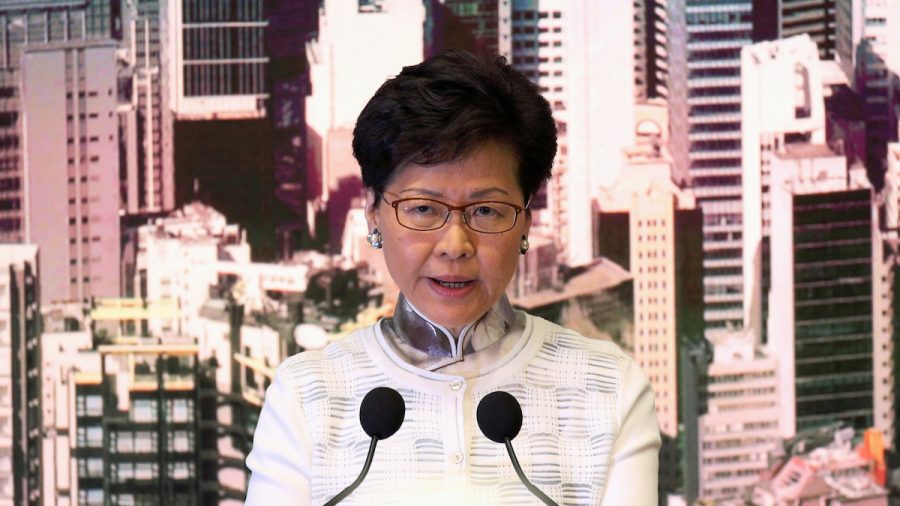In Hong Kong, a general strike and seven different rallies are moving ahead as scheduled on Aug. 5 despite another press conference in the morning by Carrie Lam. The strike and rallies are part of an ongoing protest in the city against a now-suspended extradition bill.
Lam’s remarks quickly drew condemnation from Hong Kong’s pro-democracy lawmakers and local scholars.
Lam addressed the protesters’ five demands during the press conference by questioning whether they were in line with Hong Kong’s rule of law.
The bill, first proposed by Lam’s government in February, was indefinitely suspended by Lam on June 15 following large-scale protests and public condemnation of the police’s use of force in dispersing protesters on June 12.
The five demands—including the bill’s full withdrawal, launching an independent investigation into police use of force, and universal suffrage—have become the theme of different marches and rallies since early July.
Lam said that the actions undertaken by some “radical protesters” were a direct challenge to both the “one country, two systems” model and China’s sovereignty.

The model, which has been in place since Hong Kong’s handover back to China in 1997, is supposed to guarantee Hong Kong’s autonomy and freedoms enjoyed by the people. Hong Kongers fear that such autonomy would be seriously undermined if the bill were passed, as local citizens would be vulnerable to being extradited and trialed in China’s courts—notorious for their disregard of the rule of law.
She went on to accuse protesters of using the bill to hide their “ulterior motives” that would push Hong Kong to a “very dangerous situation.” Additionally, the protesters were to blame for contributing to Hong Kong’s current economic woes, said Lam.
In response to a question asking her whether she would resign, Lam said that her resignation, or a resignation by any member of her administration, would not provide a resolution to the situation.
She also said in response to a question about the possible deployment of China’s military, known as the People’s Liberation Army (PLA), in Hong Kong that it was an online rumor she was monitoring. The spokesperson for China’s Ministry of National Defense had made veiled threats of deploying the PLA in Hong Kong during a press conference on July 23 to “maintain social order,” hinting that soldiers could be sent upon request by Hong Kong leaders.
Rebuke
Following Lam’s appearance, Hong Kong’s pro-democracy camp immediately held their own press conference, during which several lawmakers were critical of Lam’s remarks.
Lawmaker Claudia Mo said that Lam was a “malfunctioning record player” who was simply repeating her statements from previous press conferences—namely that she had not made any mistakes, Hong Kong media reported.
Democratic Party leader Wu Chi-wai said that Lam’s remarks on the Hong Kong economy were nothing more than to incite national sentiment, and to further polarize Hong Kong society.
In China, the Chinese Communist Party is known to exploit feelings of national pride to its advantage when dealing with an international crisis. For example, the party has incited its citizens to boycott foreign goods or ban tourism to certain countries that Beijing is having frictions with.
Chief economist and strategist at the Hong Kong’s Bank of Communications, K.C. Law, said that the Aug. 5 strikes would not have any impact on the local economy as it is supported by many different activities, according to an Aug. 3 article by RTHK.
Law added that, unless the local real estate sector ran into a problem, there wouldn’t be any economic contraction or large-scale layoffs.
James To, a Democratic Party lawmaker, urged Beijing to find a new person to replace Lam as Hong Kong’ top leader. If not, To said he feared that the current crisis would worsen and could eventually lead to the deployment of the PLA.
Ivan Choy, a senior lecturer at the Department of Government and Public Administration at the Chinese University of Hong Kong, told RTHK that none of what Lam said during the press conference had addressed the misgivings of protesters in the ongoing crisis.
Choy said he suspects that the Hong Kong government waits for instructions from Beijing, given that the city government has not really taken any action to engage with protesters’ demands.
Last week, workers from more than 20 sectors, including finance, accounting, health, and transportation, announced that they will take part in “three suspensions” to stop work, stop classes, and stop the markets on Aug. 5.
The “three suspensions” strike, including the seven rallies organized at different districts, including Mong Kok, Admiralty, Sha Tin, Tsuen Wan, are scheduled to be held in the afternoon.
From The Epoch Times


